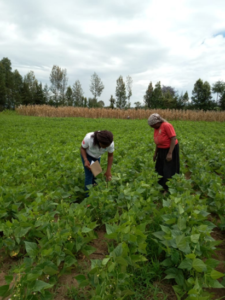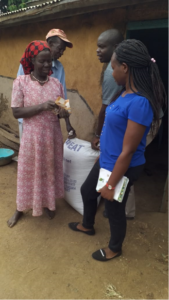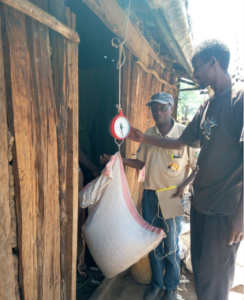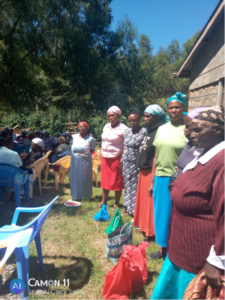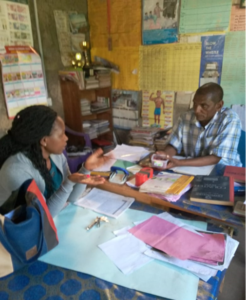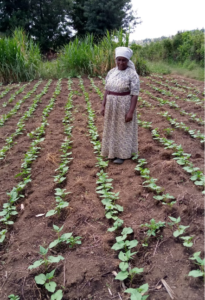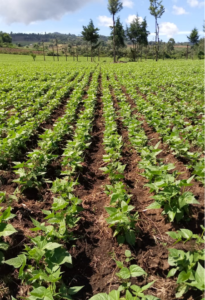By Eileen Nchanji
Achieving food and nutritional security and economic prosperity is possible even during this pandemic if men and women are given equal opportunities within an equitable system where structural barriers are removed and traditional gender norms and stereotypes are broken. With additional stress on food security caused by social and economic disruptions of the pandemic, it is key to continue working with women farmers to ensure healthy and reliable harvests to support their families during the crisis.
One structural barrier influenced by cultural norms is access to productive resources – land, seed, technology, and information. Women, compared to their male counterparts, have limited access to good quality seed, information on the nutritional and yield potential of improved seed varieties, crop management, and market access. Men attend most farming workshops and training sessions as “household heads,” even when women are encouraged to attend.
Bean farming activities by men are generally related to land clearing and preparation. Women, however, primarily do most bean farming activities like planting, weeding, spraying, harvesting and threshing. Men, on the other hand, do more of the land clearing and preparations. Because they generally do the planting, Alliance researchers work to get improved seeds directly to women.
One place where we do this is in the Elementeita ward in Nakuru county, situated in the Central Rift Valley of Kenya. The majority of the population are farmers. Lake Elmenteita/Nakuru basin is home to wild birds especially Flamingos and is one of the heritage sites together with the Lake Nakuru and Lake Bogoria by UNESCO. It is adjacent to the Soysambu ranch and conservancy home to over 12000 wild animals. Nakuru county is one of the many counties where we carry out Cultivate Africa’s Future Fund (CultiAF) II activities funded by the International Development Research Centre. We work with farmers, especially the Ushiriano women’s group to provide information on the importance of using quality seed, bean crop management, gender inclusion, nutrition, and market linkages. These activities are carried out in collaboration with Florence Mwachugha, an agricultural officer from Kenya Agricultural and Livestock Research Organization (KALRO).
Last year, Mwachugha visited the women’s group in Nakuru to give them information about available bean seed varieties suitable for their agro-ecological zones. Nyota, Angaza, and Faida are such varieties. In addition to providing higher yields, they are high in iron and zinc, which are essential micronutrients.
Micronutrient deficiency is a worrying health problem in Kenya. Anemia, which can be due to low iron intake, affects 41.6 percent of pregnant women, 27.2 percent of women of reproductive age, and 26.3 percent of preschool children. In addition, zinc deficiency affects 83.3 percent of preschool children, 80.2 percent of school children, 82.3 percent of women, and 74.8 percent of men. Poor rural households have a higher prevalence and this often results in poor growth and development and impaired immune systems.
Seed solidarity during the pandemic
At the start of last season – September 2019, women interested in farming beans were encouraged to purchase certified seeds from KALRO, upon which they were provided with additional seeds to sow on their available land. This encouraged access to certified seeds and lowered the women’s investment risk. Thirty-six women bought 65 kg of certified seeds and were awarded an additional 340 kg with the goal of increasing yields to double how much excess production they would be able to sell. The harvest was good, and the women had average yields of 271 kg per acre. After the harvest, 25 percent of women sold their grains to Smart Logistics, a woman-owned enterprise that makes pre-cooked beans and bean snacks from high-iron and zinc bean varieties. Smart Logistics bought the bean grains at a premium price of USD 60 (Ksh. 6000) for 90 kg as opposed to the market price of USD 50 (Ksh. 5000) per 90kg. The rest of the harvest was sold to friends and neighbors.
Figure 1: Florence Mwachugha, the agricultural officer providing farmer-to-farmer crop management training. Smart logistics weigh the seeds for purchase from Ushirikiano Women SHG in Nakuru (from left to right).
During this pandemic, Mwachugha asked the group of women who received the 340 kg of seed – and still had some leftover – to set aside 2 kg each to share with other women farmers who could not afford seed this season. Graciously, some women set aside more than 2 kg of seed.
So far, Mwachugha has been able to help 46 farmers obtain 131.5 kg of Nyota seed for this season.
Through the current crisis, she continues working in the field, providing training to farmers on crop management and collecting data on what farmers need in order to be able to ensure farmer resilience for now and beyond the pandemic.
“Moving forward we are looking at training women groups on producing bean flour to use in sauces and for porridge at home to reduce micronutrient deficiency and food insecurity as they are the primary direct beneficiaries from a micronutrient-enhanced diet,” said Mwachugha.
Figure 2: (Left to right) Florence collecting beans from women groups and talking with a headmaster from the local primary school who is interested in a school-feeding program that includes beans (from left to right)

